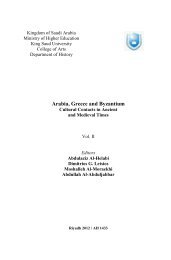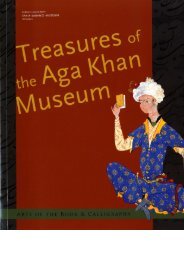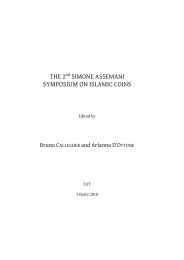ulum-al-quran
ulum-al-quran
ulum-al-quran
Create successful ePaper yourself
Turn your PDF publications into a flip-book with our unique Google optimized e-Paper software.
Summary<br />
The Qur'an, in 2:106, refers to the concept of naskh. However, there is a difference of opinion about the extent to which<br />
<strong>al</strong>-nasikh wa-<strong>al</strong> mansukh does in fact occur in the text of the Qur'an. The information concerning <strong>al</strong>-nasikh wa-<strong>al</strong><br />
mansukh must be treated with great caution as, for <strong>al</strong>l reports concerning the text of the Qur'an, two independent<br />
witnesses are required. Many of the examples which the scholars have drawn upon to illustrate this question (and I have<br />
quoted them for the same purpose) are based on one witness only. 'A'isha <strong>al</strong>one reported that 10 or 5 sucklings had been<br />
part of the Qur'anic recitation, and only 'Umar reported that the 'verse of stoning' had been included in the Qur'anic text.<br />
These leg<strong>al</strong> rulings are not included in the Qur'an precisely because they were not considered reliable, being based on<br />
one witness only. Similarly, other examples about naskh, based on the words of Ibn 'Abbas or Mujahid <strong>al</strong>one, are to be<br />
judged by the same measure.<br />
However, as mentioned there remain a sm<strong>al</strong>l number of verses which, as far as can be ascertained from the intern<strong>al</strong><br />
evidence of the Qur'an, have been superseded by other verses in the Qur'an.<br />
VARIETY OF MODES<br />
What is the meaning of <strong>al</strong>-ahruf <strong>al</strong>-sab'a<br />
The word sab'a means seven, and ahruf is the plur<strong>al</strong> form of harf, which has many meanings, among them 'edge' border,<br />
letter, word', etc. In technic<strong>al</strong> language it describes the variety of modes of the Qur'an transmitted to us, <strong>al</strong>so expressed<br />
in various forms of writing the text.<br />
Example:<br />
Read the two versions of Sura 2:9 given on plates 7 and 8. Disregard the difference in style of writing. The first example<br />
is from a Qur'an from North Africa, the second from a Qur'an from Jordan. In the North African version, the word<br />
'yukhadi'una' (they deceive) is used twice, while in the Jordan version, the word occurs as 'yakhda'una' in the second<br />
instant. Both are correct and accepted readings, since they have been transmitted to us. Also there is no objection from<br />
the viewpoint of grammar or correct language and the writing without vowel signs can carry both readings.<br />
The Language of the Quraish<br />
In the time of the Prophet Muhammad when the Qur'an was reve<strong>al</strong>ed, the Arab tribes scattered <strong>al</strong>l over the peninsula,<br />
spoke a number of di<strong>al</strong>ects, each containing peculiar words and idioms.<br />
The language of the Quraish had developed into a form of 'high Arabic' due to the many influences it absorbed, being<br />
spoken at the main centre of trade and pilgrimage in Arabia. Hence this language was obviously the most suitable to<br />
carry the messages of revelation which were to reach <strong>al</strong>l peoples and not be restricted to a particular tribe.<br />
The Seven Modes<br />
The hadith reports tell us that the Qur'an was actu<strong>al</strong>ly reve<strong>al</strong>ed in seven modes (<strong>al</strong>-ahruf <strong>al</strong>-sab'a). This has been<br />
narrated by more than ten of the Prophet's Companions, among them Abu Bakr, 'Umar, 'Uthman, Ibn Mas'ud, Ibn 'Abbas<br />
and others. [Itqan, I, p. 41.]<br />
The following is the hadith in Bukhari:<br />
'Narrated 'Abdullah bin 'Abbas: Allah's apostle said: Gabriel recited the Qur'an to me in one way. Then I<br />
requested him (to read it in another way), and continued asking him to recite it in other ways, and he<br />
recited it in sever<strong>al</strong> ways till he ultimately recited it in seven different ways'. [Bukhari, VI No. 513.]<br />
On another occasion, 'Umar complained to the Prophet that Hisham had recited Sura <strong>al</strong>-furqan in a way different from<br />
what 'Umar had heard from the Prophet, but the Prophet said: '... this Qur'an has been reve<strong>al</strong>ed to be recited in seven<br />
different ways, so recite of it whichever is easier for you'. [Bukhari, VI No. 514.]<br />
S<strong>al</strong>man is reported to have said that he read a passage from 5:82 in the presence of the Prophet in the following two<br />
versions, the first of which is now in the Qur'anic text, while the second constitutes a variant reading according to 'Ubay<br />
b. Ka'b: [Ibn Abi Dawud., p. 129.]<br />
<br />
dh<strong>al</strong>ika bi-anna minhum qissisina wa ruhbana.





